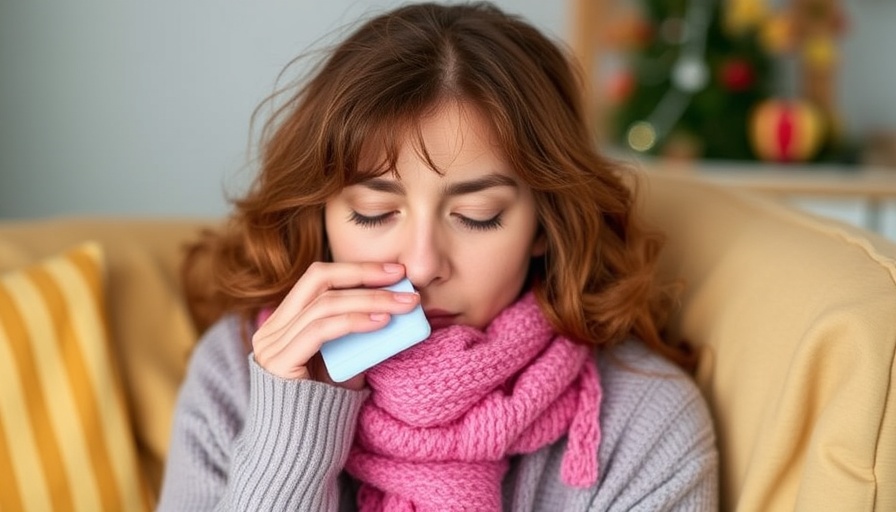
The Growing Burden of Hay Fever: Understanding the Basics
For those struggling with hay fever, sunny days can quickly turn into a test of endurance. As the pollen count rises, many find themselves grappling with symptoms ranging from itchy eyes to sneezing and congestion. The term 'hay fever,' or seasonal allergic rhinitis, refers to an allergic reaction to pollen that affects millions, especially during spring and summer months.
In the UK alone, about 25% of adults are believed to be affected by pollen allergies, and it's not just a childhood concern. Many individuals don't develop symptoms until their 20s or 30s, as evidenced by allergy specialist Prof. Adam Fox. It’s crucial to recognize that the increasing prevalence of hay fever can be attributed to factors such as climate change, which Dr. Sophie Farooque describes as creating conditions where pollen-producing plants flourish.
Recognizing Hay Fever Symptoms: Is It Just a Cold?
Identifying whether you're experiencing hay fever or merely a cold can be challenging, but certain clues can help distinguish between the two. As Dr. Farooque advises, if your symptoms include itchy eyes, throat, or inner ears, it's likely hay fever rather than a common cold. Additionally, the onset of symptoms may coincide with certain seasons, giving another hint towards the underlying cause.
Medical professionals recommend taking an antihistamine if symptoms are uncertain; if they subside, the cause is likely an allergy. This proactive approach can alleviate discomfort and prevent further complications, helping you maintain a vibrant and active lifestyle.
Practical Tips to Manage Hay Fever Symptoms
With hay fever affecting millions, how can you cope without hiding from the glorious outdoors? Here are practical recommendations:
- Antihistamines: Start taking them before the pollen season begins to manage symptoms proactively.
- Stay Informed: Monitor local pollen levels and adjust outdoor activity accordingly. Apps and websites are available to help you track daily counts.
- Shower After Outdoor Activities: This helps wash away pollen that may cling to your skin and hair, reducing exposure indoors.
Future Insights: Climate Change and Hay Fever Trends
The relationship between climate change and allergies is likely to deepen as the environment continues to change. With global temperatures rising, plants are expected to produce more pollen, causing longer and harsher allergy seasons. Dr. Farooque states, "Climate change acts like Miracle-Gro for plants," leading to an increase in pollen production. This underscores the importance of adapting our approaches to managing allergies in an evolving climate.
Building Community Awareness Around Hay Fever
Awareness is key in navigating the challenges of hay fever. Community health campaigns can help educate individuals about symptoms and management, fostering support networks for those affected. Furthermore, events focusing on health and wellness can bring together experts and individuals looking to improve their quality of life.
With a rise in interest surrounding health and wellness, particularly in cities like San Antonio, exploring community health resources, support groups, and workshops on environmental health can offer significant benefits. Engaging with local community health and wellness initiatives not only increases awareness but also provides collective strategies for managing allergies.
Taking Action: Steps Towards Optimal Health and Wellness
Considering the potential for hay fever to disturb your life, it’s important to adopt effective strategies for relief. Consult with a healthcare provider regarding the best antihistamines or alternative treatments, such as naturopathic options. Healthy living often entails proactive steps; understanding how your body responds can empower you to take control of your health.
For those looking to enrich their lives through wellness initiatives in your community, seek out local events and resources designed to promote health awareness. This could mean participating in health fairs, enjoying wellness retreats, or even reading up on the latest health and wellness articles online.
It's time to equip yourself with knowledge and resources that not only alleviate your symptoms but also boost your overall well-being. Whether you turn to natural remedies or a structured wellness program, the journey to better manage your hay fever while embracing the joy of summer is a worthwhile pursuit.
Don’t let hay fever dictate your enjoyment of the outdoors! Find support and take proactive measures to breathe easier this season and make the most of your health and well-being.
 Add Row
Add Row  Add
Add 




 Add Row
Add Row  Add
Add 


Write A Comment